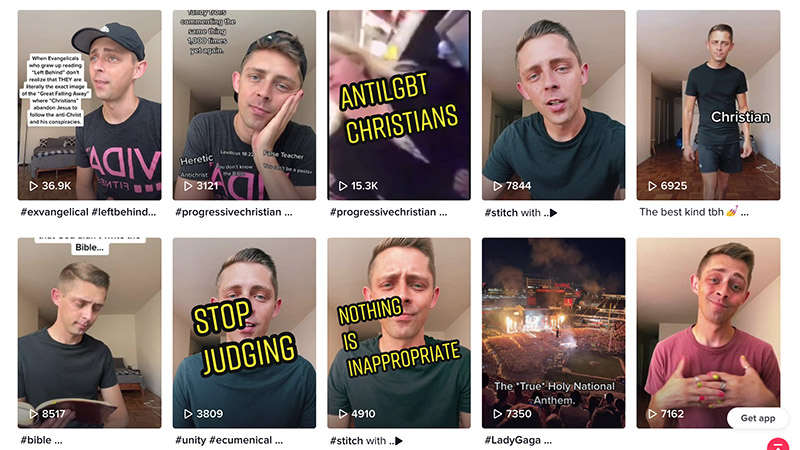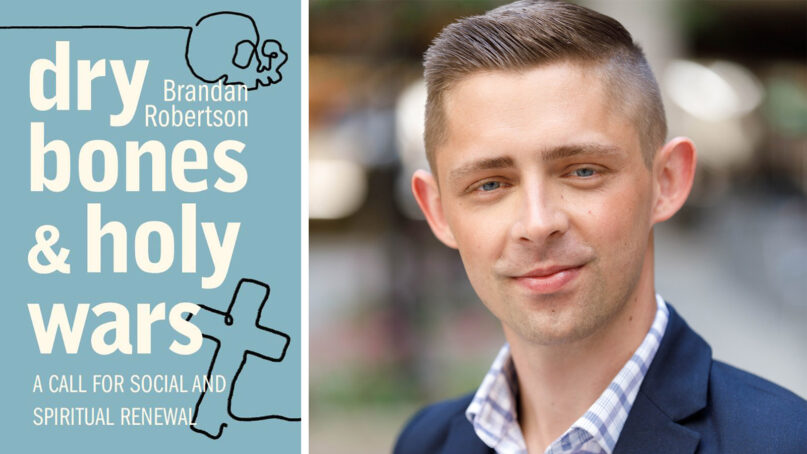(RNS) — The label “heretic” doesn’t faze Brandan Robertson.
“I’m not interested in playing the orthodoxy game,” the TikTok pastor told Religion News Service in a recent phone call. Once an evangelical darling, today Robertson is known to his 195.5K followers as an openly gay Christian pastor “making Christianity queer again,” per his TikTok bio.
When Robertson, 30, isn’t posting videos critiquing conversion therapy or Christian nationalism, he is focusing on his Ph.D. in religion at Drew Theological School in Madison, New Jersey, or leading Metanoia Church, a digital spiritual community that emerged during the pandemic. In his latest book, “Dry Bones and Holy Wars: A Call for Social and Spiritual Renewal,” Robertson draws from sermons he delivered during the Trump presidency to encourage young progressives to take heart and take action. By engaging Scripture without fear of “getting it wrong,” Robertson hopes readers who have been disenchanted by biblical texts will be inspired by them once again.
The book, published Thursday (Oct. 6) through Orbis Books, is split into short, digestible chapters meant more to provoke questions than to provide answers, according to Robertson. RNS spoke to the author about deconstruction, suffering, Jesus’ divinity and whether God is kind. The interview has been edited for length and clarity.
You wrote that you were supposed to be the next evangelical superstar. What happened instead?
I think that points to the narcissistic culture that evangelicalism tends to perpetuate, especially among those on track to become clergy. That’s something I’ve had to wrestle with for the past 15 years. My entire Christian identity was wrapped up in being a pastor and that basically meant being a celebrity. At the church I grew up in, my pastor was untouchable. He was whisked around in black SUVs. As I studied Scripture, I was convicted about the kind of Christianity I was part of. It didn’t represent the humble, sacrificial servant we see in the person of Jesus. And I think we’re seeing the fruits of that kind of theology in really dramatic ways. In the past few years, so many evangelical leaders are having moral failures. Discovering these much smaller churches all across the country that are truly dedicated to being lights of justice in their community, that are truly dedicated to being humble, quiet servants of others, has changed my life.
You write that progressives can also let fear lead to demonization. How so?
In my engagement on TikTok, as much as I try to stay above the fray, it’s so easy in our algorithm-driven world to see people with different ideological perspectives or religious beliefs as our enemies. I think progressives just as easily as conservatives can begin seeing the person on the other end as the enemy or as someone who isn’t a real human being. What I’ve learned over my ministry is that when you can engage people on an empathic level, when you can relate to them as human beings and share common stories and experiences, that’s actually how you transform hearts and minds — not ideological debate, not calling someone a heretic or a homophobe.

A variety of Brandan Robertson’s TikTok posts. Screen grab
In your book you write, “The promise of the gospel is that suffering can be redeemed.” How does that theology play out when it comes to tragedies like abuse or cancer?
I think sometimes there’s this Christian glorification of suffering, and I don’t think that’s healthy. The question about why suffering happens is above everyone’s theological pay grade. But when suffering does happen, there has to be a path forward to bring the world healing. In my own life, I grew up in an abusive home. By the age of 12, I was a suicidal, closeted gay person in a Christian environment that said being gay was evil. I really saw no path forward. But now, years later, I can stand as an openly gay Christian pastor and use the pain as a way to hopefully prevent some of that suffering from happening for others.
You write that kindness is key to justice. Can you say more about why that’s the case?
Kindness is not just a mere emotion, or just being nice. Kindness is a way of acknowledging the humanity of another person. Jesus teaches things like “love your enemy” or “do good to those who persecute you.” Those sayings can be unpopular on the surface, but I do think there’s a subversive truth underneath that. We need to figure out the tension between acknowledging someone’s humanity, empathizing even with those we might perceive as enemies, and then with that as the framework, speaking truth to power and dismantling systems of injustice. It’s not an easy, straightforward task. But if it’s just speaking truth to power or just loving your enemy, it doesn’t create the kind of progress that I think so many of us are longing for.
Do you think God is always kind?
I think my perspective on the different faces of God we see in the Bible is that each one is not necessarily an accurate or objective representation of who God is, but rather, shows humanity’s understanding of God at different points throughout history. And throughout the Hebrew Bible, we find plenty of images of a compassionate God, a God who was willing to dialogue with humanity and be gracious. Sometimes in the New and in the Old Testament, we see a God who I think is a creation of humanity. That God gives us permission to destroy our enemy and strikes people dead. When I read those texts, I wouldn’t say I find that God to be one I necessarily believe in. I don’t see that throughout the majority of the Hebrew Bible or in the life and teachings of Jesus. And so I’m brought into a wrestling with the authors and wonder, is this the author’s desire for who God should be?
RELATED: Lonely no more: Questioning Christians find belonging on TikTok
Your book argues both that Jesus sinned and that we are essentially the same as Jesus. What led you to see Jesus’ humanity in this way?
In the Gospels there’s a story about a Syrophoenician woman, a woman from a different religious and ethnic background. Jesus resists healing her daughter. And however you look at that, it should raise our eyebrows. But the woman pushes back. She says, “Even dogs deserve crumbs from the table.”
Whether you want to interpret it as ethnic or religious bias, she confronts Jesus’ bias and he heals her daughter. For somebody to hold a mirror up to Jesus, and for him to have the willingness to say, let me correct this wrong — in this moment when we are talking about privilege, racism and homophobia, it’s profound to encounter a Jesus willing to change his mind to align with justice and equality.
What’s your response to those who call you a heretic?
Probably, I would agree with them. I was transformed from an evangelical to a progressive by meditating on First John, which says God is love and love casts out all fear. And I realized so much of my theology had been rooted in this idea that if I didn’t check the right ideological boxes, that somehow that was going to put me outside of God’s love and grace. But anything that is causing me to fear is not from God, based on that Scripture. That opened the door for me to ask questions more openly.
As a student of church history, I’ve become quite skeptical of the development of what we call orthodoxy. It wasn’t a divine process. It was humans being called under an emperor to debate about what was right and what was wrong theologically. So I’m not interested in playing the orthodoxy game. I’m interested in engaging with the biblical texts from a historical context, but also asking questions from different modern lenses. I recognize that approach to Scripture shuts the door on some folks. But for those who are deconstructing and reconstructing faith, I think being able to engage Scripture with this creativity and openness allows for a renewed relationship with the Bible that becomes life-giving once again.
RELATED: Deconstructing? There’s a coach for that.





